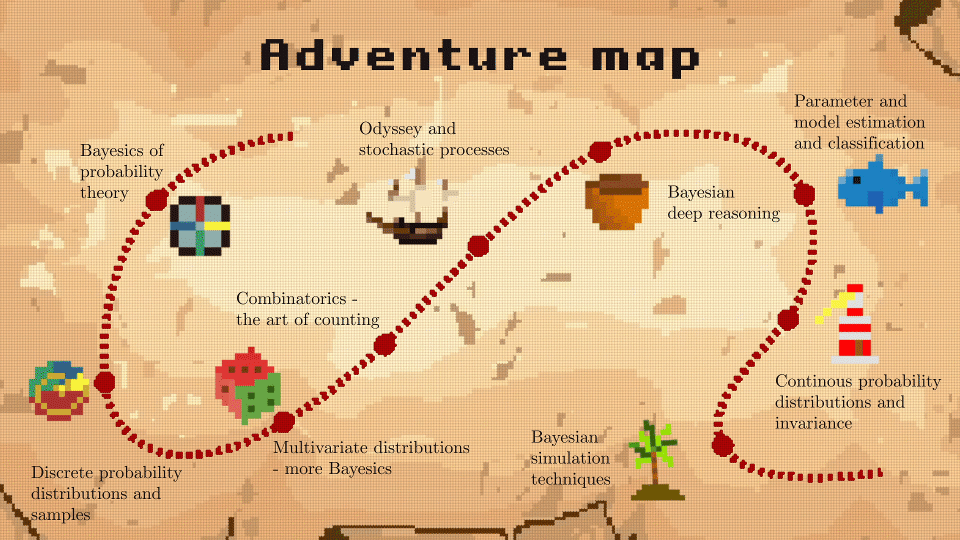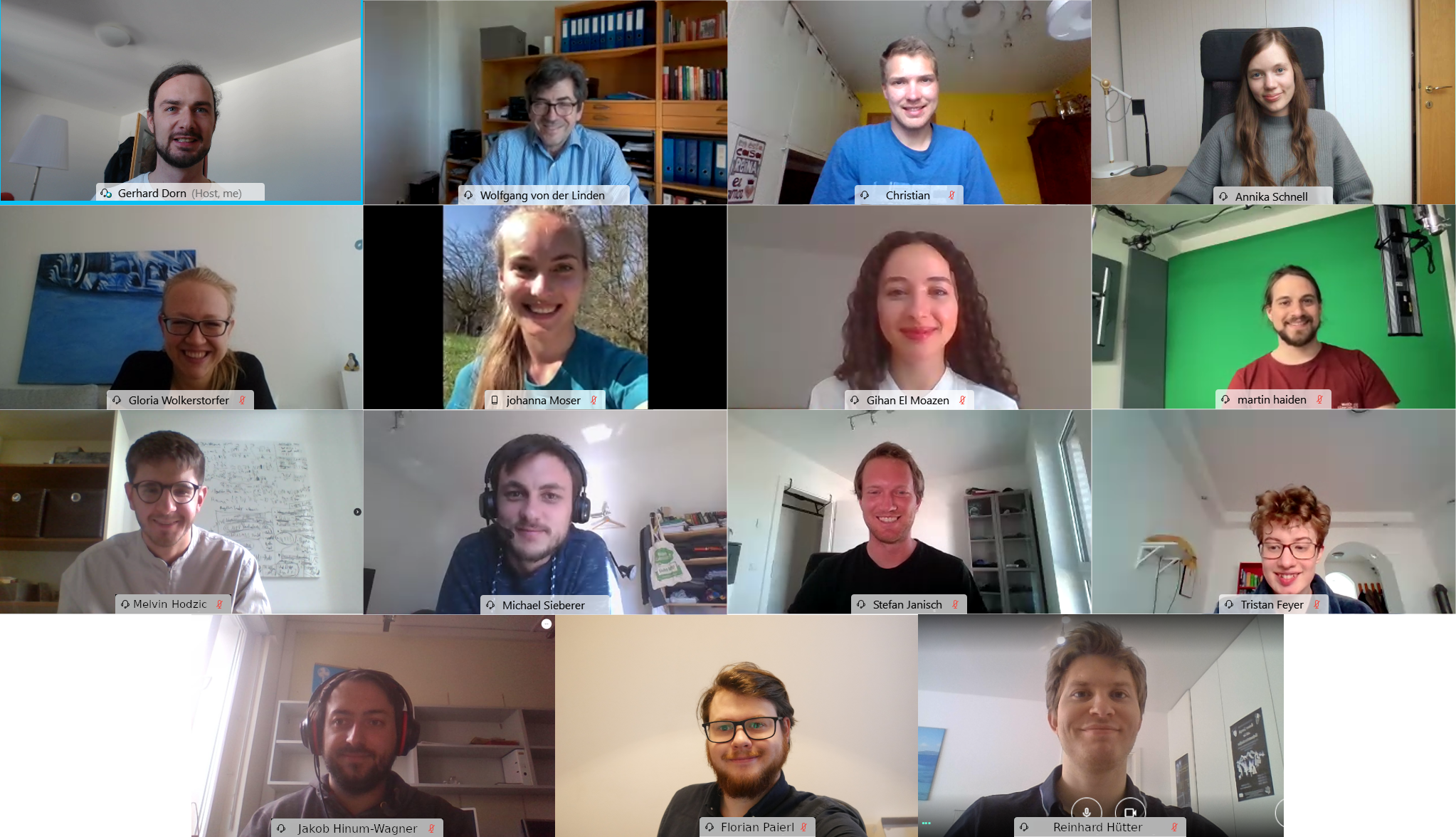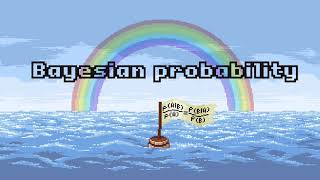


Bayesian probability theory
Graz University of Technology
Bayes' team
About
Trailer for Bayesian probability theory
General Course Information
The course is designed to enhance your learning experience.
Each unit is motivated by a story based problem and focussed on providing the skills and techniques to solve it.
Be part of Captain Bayes' crew to sail the ocean of uncertainties and big data and help to succeed in her adventures of probability theory.
to sail the ocean of uncertainties and big data and help to succeed in her adventures of probability theory.
Get to know the ideas of your fellow crew comrades Bernoulli, Pascal, Laplace and many more that accompany you during your journey.
The adventures of Captain Bayes are followed by the content videos that deliver the theories and concepts of each unit. To familiarize you with the new learnings, interactive quizzes are integrated in the video to deepen your knowledge practically.
Furthermore listen to Ernesto, the parrot![]() , that will guide you as your learning buddy throughout the course and provide you with learning tips and further material.
, that will guide you as your learning buddy throughout the course and provide you with learning tips and further material.
At the end of each unit you are ready to help Captain Bayes to solve the raised problems in a self-assessment (5-10 questions).
Have fun!
Content
Course Content
The primary motivation for this course is to warm a broader audience to probability theory, as it is central to all scientific fields. Or as E.T. Jaynes - one of the most important researchers on probability theory of the last century - put it: "Probability is the logic of science."
This course equips you with the methods of probability theory and enables you to deal with uncertainties, qualify decisions, assign probabilities and estimate parameters and models. The Bayesian approach provides techniques to update "partial truth".
As a whole, this MOOC delivers the basics that are needed and benefitial for the fields of machine learning and data science.
The course is split into units dealing with discrete and continuous variables with 9 units altogether:
- Unit 1: Bayesics of probability theory
- Unit 2: Discrete probability distributions and samples
- Unit 3: Multivariate distributions - more Bayesics
- Unit 4: Combinatorics - The art of counting
- Unit 5: Odyssey and stochastic processes
- Unit 6: Bayesian deep reasoning
- Unit 7: Parameter and model estimation and classification
- Unit 8: Continuous probability distributions and invariance
- Unit 9: Bayesian simulation techniques

Course Goals
The ambition of this course is not only to deliver the concepts of probability theory but to promote critical questioning and to sensitize for decision making.
Dozens of paradoxes show how easily the human mind can be misled. Therefore, the skill to interprete numbers and facts is as important as the ability to make qualified estimations. The course will equip you with the toolbox to draw inference based on uncertain and incomplete information.
Specifically the course will help you to understand how to assign probabilities in a classical and statistical way and more importantly how to use new evidence to update probabilities and solve inverse probability problems (Bayes theorem).
Especially rigorous updating and solving inverse problems are fundamental for machine learning and data science and some examples in the course will show how to estimate parameters and classify data.
Since correct data processing is crucial for knowledge gain by experiments, dealing with outliers and the rigourous drawing of conclusions from sample sets will be topics of this course.
After completing this course you will be enabled to formulate probabilistic statements from (new) data and to use simulations to draw conclusions for stochastic processes.
From a didactical perspective a major goal is to improve discussion culture among participants, to help you to express your ideas and your questions and to foster your engagement.
Previous Knowledge
The first seven modules deal with basic algebra. The content is designed for Bachelor students with a basic mathematical backround. For unit 1 to 7 the sum notation, vector calculus and simple algebraic transformation should be known. The last units about continuous variables require integration techniques.
Course Procedure
Each unit is structured in the following way:
- Adventure of Captain Bayes and her crew:
A short movie introduces the problems and topics of the unit. - Content video:
The content video delivers the language, knowledge and theorems of each unit and discusses the questions raised by Captain Bayes and her crew.
The video is garnished with small questions, that shall help you to readily apply the discussed concepts. - Interactive simulations:
To deepen the comprehension, interactive simulations (pluto notebooks running Julia) are provided for you, that also allow you to adopt the code if you are interested in and like to experiment with it. - Forum:
The forum shall be the place for you to discuss questions with the other participants.
We try to moderate your discussions and support you with answers to your questions if possible. - The quiz:
The quiz marks the end of each unit and helps you to proof your obtained skills. You will be rewarded with a badge which acts as a microcredential (see https://info.badgr.com/) and can be downloaded as image. Your email address and the course details will be hashed in the meta-data of that image and can be verified using https://badgecheck.io/
Important note for students of the course "Wahrscheinlichkeitstheorie, Statistik und Datenanalyse" held at Graz University of Technology and University of Graz: In order to obtain the corresponding ECTS of this course, the positive completion of this MOOC (75%) is strongly recommended in addition to the course examination. In order to do so, it is necessary to be a student at Graz University of Technology or Universtiy of Graz and to register for the corresponding course via TUGRAZonline or UNIonline.
Lecture at TU Graz / Uni Graz:
Wahrscheinlichkeitstheorie, Statistik und Datenanalyse - (PHY.E50UF, PHY.E50UB)
Please register for this MOOC with your eduID in any case. This is absolutely necessary for the issue of a certificate (confirmation of participation).
For further details, please refer to the course description or your curriculum itself, or contact the lecturer.
Certificate
For actively participating in the course you will receive an automatic
confirmation of participation (certificate) which includes your
username, the course title, course duration as well as the hours
required to complete the course. We want to point out that this
certificate merely confirms that the user answered at least 75% of the
self-assessment questions correctly.
Course Instructor
Bayes' team
TEAM BAYES:

Project manager:
Gerhard Dorn is a project assistant at the Institute of Theoretical and Computational Physics and engaged in teaching for over ten years.
Besides his physics research in quantum transport he has a strong mathematical background and is enthusiastic about story telling in science communication.
Team Pixel Art:
Gihan El Moazen is a bioengineering student with a foible for pixel art and graphical design.
Annika Schnell is a physics and informatics student who is passionate about game development and pixel art.
Creative Story and content development team:
Tristan Feyer, a physics student, brings in his motivation for story development, writing dialogue and drafting sceneries.
Gloria Wolkerstorfer is finishing her master studies in theoretical physics with a focus on Bayesian probability and like Tristan, is part of the creative story and content development team.
Interactive simulation and voice acting:
Johanna Moser is a physics student who contributes to developing interative simulations and related stories.
Michael Sieberer is a PhD student in physics who helps realizing the solution for interactive simulations.
Margit Taibon-Lindheim, Christian Gruber, Florian Payerl and Jakob Hinum-Wagner are part of the voice acting team supported by our vocal coach Reinhard Hütter.
Animation and sound:
Stefan Janisch (LLT TU Graz) is the multimedia artist working on the postproduction and animation of the adventure movies.
Martin Haiden (LLT TU Graz) is the sound engineer responsible for sound recording and sound production.
Melvin Hodzic is a physics student engaging in the video editting and animation of the lesson videos.
Visiting professor - Galleon's figure of Bayesian probability theory
John Skilling a former professor at University of Cambridge is one of the pioneers of Bayesian probability theory and contributes as the inventor of Nested Sampling to the unit on Bayesian simulation techniques - even as part of the voice acting team.
Login & Enrol Currently: 867 Participants
Free for all € 0.00
Partners

Graz University of Technology
Graz
